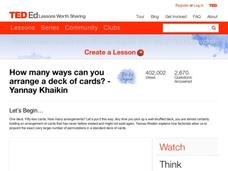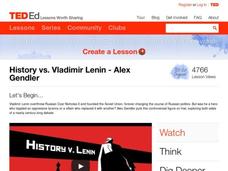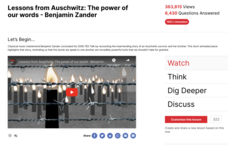Administrative Office of the US Courts
Nomination Process
"I do solemnly swear that I will support and defend the Constitution of the United States..." Scholars investigate the nomination process of Supreme Court justices when assuming office. Through examination of primary and secondary...
Curated OER
5 Broken Cameras: How Storytellers Shape the Story
5 Broken Cameras, the award-winning documentary nominated for a 2013 Academy Award and winner of the Sundance 2012 Directors Award is the focus of a resource packet that includes a lesson plan, discussion guide, reading lists, background...
PBS
What Are the Primaries and Caucuses?
What are the essential differences between primaries and caucuses? As part of a study of the process by which Americans select their candidates for US president, class members examine the nominating process, the changes that have...
CK-12 Foundation
APR and APY: APR vs. APY
Who wins the battle of the interest rates? Scholars use an interactive to investigate three different bank rates. Comparing APR and APY lets them see how nominal and effective rates differ.
Maryland Department of Education
Our Children Can Soar
Amazing efforts of African American leaders are celebrated in a lesson on civil participation. The engaging resource focuses on primary and secondary sources to analyze the impact of African American leaders such as Ella Fitzgerald....
Federal Reserve Bank
GDP: Does It Measure Up?
Here is resource that offers a very clear explanation for how economists measure economic growth by comparing real GDP over time. There is also an additional worksheet that details the expenditure method and four components for...
Encyclopedia Britannica
Becoming US President
It's that time of year, and the year. Once again the race is on for the White House. It's important that young voters, and would-be voters, understand the process for becoming the United States President. Class members research the...
iCivics
Mini-Lesson: Presidential Appointments
Can the president of the United States hire anyone he or she wants for any position in the executive branch? The answer may surprise scholars! After investigating the appointment process, historians, by themselves or in pairs, analyze...
PBS
Climate Change as a Scientific Theory
Get your class thinking about climate change as a scientific theory. Guided by a handout, emerging earth scientists read articles and take notes about glaciers and sea ice. To conclude, they write an evaluation of the evidence for...
TED-Ed
Sugar: Hiding in Plain Sight
Did you know that you can find added sugars in three-quarters of the foods you find in grocery stores? Invite your learners to consider how much sugar exists in the food products we eat on a day-to-day basis, as well as to learn about...
TED-Ed
The Fundamentals of Space-Time: Part 3
If you weren't already blown away by first two installments, check out this clip on how gravity and space-time interact! Our physicist friends, Pontzen and Whyntie, continue their discussion of these motion concepts for your high...
TED-Ed
How to Speak Monkey: The Language of Cotton-Top Tamarins
Tamarin monkey language can be categorized by stem upsweep, duration, peak frequency, and frequency change. Although other complex terminology is used to describe the 38 calls of this species, the video is easy to follow and a...
TED-Ed
A Digital Reimagining of Gettysburg
Why would Robert E. Lee order Pickett's Charge, an action that changed the course of the Civil War? Geographer and historian Anne Knowles uses digital technology to explain what she thinks is the missing piece in trying to understand...
TED-Ed
The Colossal Consequences of Supervolcanoes
The threat posed by super volcanoes is explored in a short video that reviews the destruction caused by Mount Tambora in 1815 and by Peru's Huaynaputina in 1600. Think it can't happen again? The narrator contends that the explosive...
TED-Ed
How to Choose Your News
How do you get the truth unfiltered by middlemen? Tune into various sources and note the differences is the suggestion in a short video that begins by providing examples of how media gatekeepers have manipulated information and how those...
TED-Ed
From Aaliyah to Jay-Z: Captured Moments in Hip-hop History
To take "the definitive portrait of that person in that moment" is the quest of photographer and hip-hop historian Jonathan Mannion. In this short video, Mannion details his dedication to his art and the process he goes through to catch...
TED-Ed
How Many Ways Can You Arrange a Deck of Cards?
Entertain and grab your learners' attention with a short video clip that engagingly teaches the concept of a permutation and how a factorial is a wonderful shortcut for theoretical probability calculations.
Youth Leadership Initiative
Selecting a President: Primaries and Caucuses
What is a party caucus anyway? And what part do caucuses play in the primaries? Everything future voters need to know about the four stages in the presidential selection process is provided by this resource. The 2012 US Presidential...
USA.gov
Three Branches of Government
Here is a very simple handout that illustrates how the Constitution provides for a separation of powers between the legislative, executive, and judicial branches.
Council for Economic Education
A Penny Saved
A penny saved is a penny earned! Scholars research the different ways to save money over a lifetime. They investigate the Rule of 72, compound interest, and sub-prime loans to gain an understanding of how banks aid in the saving process....
Savvas Learning
Political Parties
What is a political party, and what major parties exist in American politics today? How did the party system develop in American history, and how are parties organized? These questions and many other details regarding the political party...
TED-Ed
History vs. Vladimir Lenin
Vladimir Lenin is on trial in an engaging, animated video where the merits and consequences of the formation of the Soviet Union and Lenin's actions are reviewed. This is a great way to illustrate how to establish and argue unique...
TED-Ed
Lessons from Auschwitz: The Power of Our Words
Some words are best left unspoken. Words matter, according to Benjamin Zander, conductor, teacher, and lecturer. To illustrate his point, Zander recounts a story told to him by a survivor of Auschwitz. As a result of her experience this...
TED-Ed
What is the World Wide Web?
Did you know that the World Wide Web and the Internet are not the same thing? Did you know that Tim Berners-Lee is considered the father of the Web? Networks, web servers, web hosts, website addresses, domain names, web languages,...

























